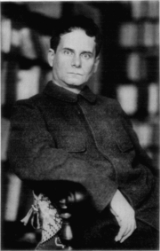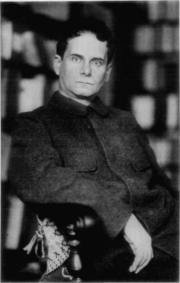
Maximilian Harden
Encyclopedia

Biography
Born the son of a JewishHistory of the Jews in Germany
The presence of Jews in Germany has been established since the early 4th century. The community prospered under Charlemagne, but suffered during the Crusades...
merchant in Berlin
Berlin
Berlin is the capital city of Germany and is one of the 16 states of Germany. With a population of 3.45 million people, Berlin is Germany's largest city. It is the second most populous city proper and the seventh most populous urban area in the European Union...
he attended the Französisches Gymnasium
Französisches Gymnasium Berlin
The Französisches Gymnasium — Collège Français Berlin is a long-existing francophone gymnasium in Berlin, Germany.-History:It was founded in 1689 by Elector Frederick III of Brandenburg for the children of the Huguenot families who had settled in Brandenburg-Prussia by his invitation, being...
until he began to train as an actor and joined a traveling theatre troupe. In 1878 Harden converted to Protestantism
Protestantism
Protestantism is one of the three major groupings within Christianity. It is a movement that began in Germany in the early 16th century as a reaction against medieval Roman Catholic doctrines and practices, especially in regards to salvation, justification, and ecclesiology.The doctrines of the...
and started his journalistic career as a theatre critic in 1884. He also published political essays under the pseudonym Apostata in several liberal newspapers like the Berliner Tageblatt
Berliner Tageblatt
The Berliner Tageblatt or BT was a German language newspaper published in Berlin from 1872-1939. Along with the Frankfurter Zeitung, it became one of the most important liberal German newspapers of its time.-History:...
edited by Rudolf Mosse
Rudolf Mosse
Rudolf Mosse was a German publisher and philanthropist.-Biography:Mosse was born in Grätz, Grand Duchy of Posen, as the son of Dr. Markus Moses, a noted physician...
.
From 1892 Harden published the journal Die Zukunft
Die Zukunft
Die Zukunft was a German social-democratic weekly founded and edited by Maximilian Harden. It published allegations of homosexuality of Philip, Prince of Eulenburg, leading to the Harden–Eulenburg Affair in Wilhelmine Germany.Die Zukunft was also the name of an exile German language paper, both...
(The Future) - microfiche edition - in Berlin. His baroque style was mocked by former friend Karl Kraus
Karl Kraus
Karl Kraus was an Austrian writer and journalist, known as a satirist, essayist, aphorist, playwright and poet. He is regarded as one of the foremost German-language satirists of the 20th century, especially for his witty criticism of the press, German culture, and German and Austrian...
, who even wrote a satire about "translations from Harden".
Initially a monarchist, Harden became a fierce critic of Kaiser Wilhelm II and his entourage around Prince Philip of Eulenburg and Kuno von Moltke. His public accusations of homosexual
Homosexuality
Homosexuality is romantic or sexual attraction or behavior between members of the same sex or gender. As a sexual orientation, homosexuality refers to "an enduring pattern of or disposition to experience sexual, affectional, or romantic attractions" primarily or exclusively to people of the same...
behaviour - according to Paragraph 175
Paragraph 175
Paragraph 175 was a provision of the German Criminal Code from 15 May 1871 to 10 March 1994. It made homosexual acts between males a crime, and in early revisions the provision also criminalized bestiality. All in all, around 140,000 men were convicted under the law.The statute was amended several...
a criminal offence at that time - from 1906 on led to numerous trials and did sustainable damage to the reputation of the ruling House of Hohenzollern
House of Hohenzollern
The House of Hohenzollern is a noble family and royal dynasty of electors, kings and emperors of Prussia, Germany and Romania. It originated in the area around the town of Hechingen in Swabia during the 11th century. They took their name from their ancestral home, the Burg Hohenzollern castle near...
and the German jurisdiction. In reaction Karl Kraus, disgusted by the public display of intimate details, wrote an obituary: Maximilian Harden. Eine Erledigung (A Settlement). By 1914, Harden had again moved sufficiently to the right that he welcomed the German invasion of Belgium
Western Front (World War I)
Following the outbreak of World War I in 1914, the German Army opened the Western Front by first invading Luxembourg and Belgium, then gaining military control of important industrial regions in France. The tide of the advance was dramatically turned with the Battle of the Marne...
, however after the war he supported the signing of the Treaty of Versailles
Treaty of Versailles
The Treaty of Versailles was one of the peace treaties at the end of World War I. It ended the state of war between Germany and the Allied Powers. It was signed on 28 June 1919, exactly five years after the assassination of Archduke Franz Ferdinand. The other Central Powers on the German side of...
.
In the following years Harden's readership diminished. On 3 July 1922, a few days after the assassination of Walther Rathenau
Walther Rathenau
Walther Rathenau was a German Jewish industrialist, politician, writer, and statesman who served as Foreign Minister of Germany during the Weimar Republic...
, he was severely injured in an assault conducted by Freikorps
Freikorps
Freikorps are German volunteer military or paramilitary units. The term was originally applied to voluntary armies formed in German lands from the middle of the 18th century onwards. Between World War I and World War II the term was also used for the paramilitary organizations that arose during...
members. In the following trial the court ruled that his writings had provoked the two assailants, Bert Weichardt and Albert Wilhelm Grenz. Both were charged and sentenced to 2 years and 5 months and 4 years respectively.
Harden abandoned the publishing of Die Zukunft and in 1923 retired to Montana, Switzerland
Montana, Switzerland
Montana is a municipality in the district of Sierre in the canton of Valais, Switzerland. It is one of the six municipalities that form the ski resort Crans-Montana .-History:...
where he died four years later. His grave is located in Berlin at the Friedhof Heerstraße
Friedhof Heerstraße
The Friedhof Heerstraße cemetery is located at Trakehnerallee 1 , district of Charlottenburg-Wilmersdorf in Berlin, Germany, beneath the Olympiastadion. It covers an area of 149,650 square meters....
(Feld 8-C-10 (Reg. 335) (Ehrengrab
Ehrengrab
An Ehrengrab is a distinction granted by certain German, Swiss and Austrian cities to one of their citizens for extraordinary services or achievements in their lifetime. If there are no descendants or institutions to care for the gravesite, the communities or cities will take responsibility for...
))
External links
- Maximilian Harden, Krieg und Friede, Berlin: Erich Reiss, 1918.
- "The Controversy of Zion", Geoffrey WheatcroftGeoffrey WheatcroftGeoffrey Albert Wheatcroft is a British journalist and writer.- Education :He was educated at University College School, London, and at New College Oxford, where he read Modern History.- Publishing and journalism :...
, 1996, ISBN 0201562340; pp. 203–4 deal with Harden

